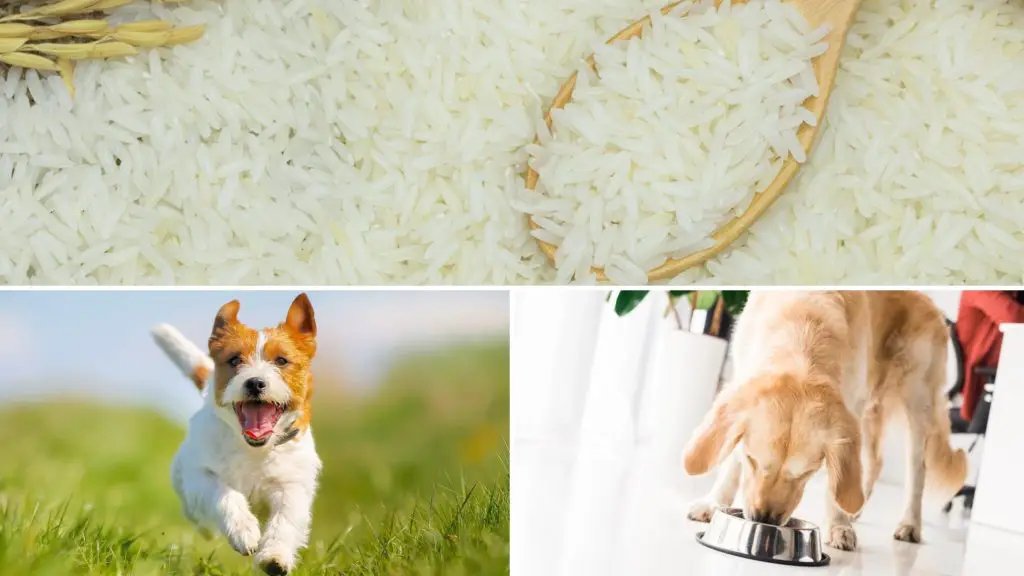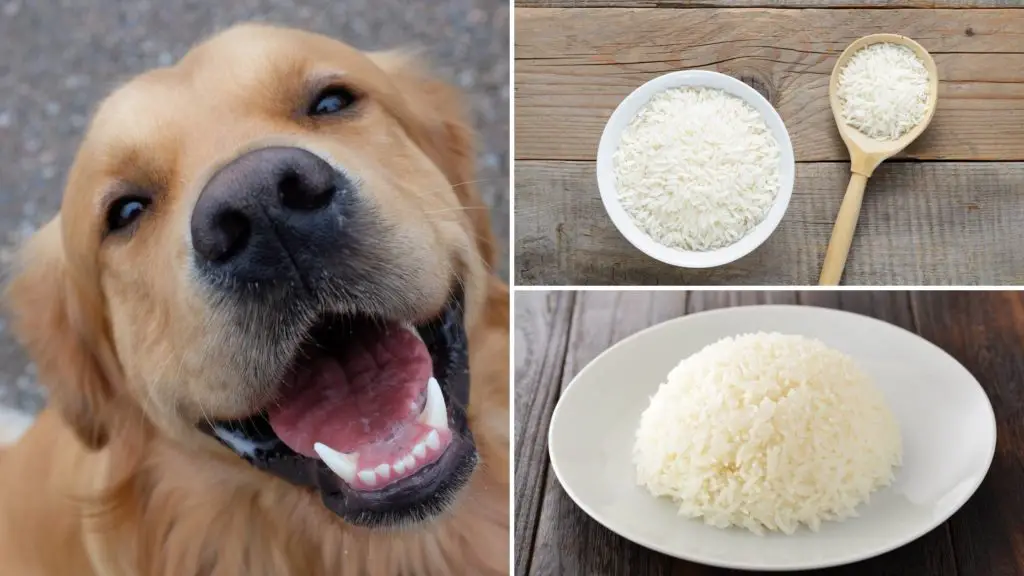Last Updated on 08/11/2021 by Veronica Jones
Most dog owners rely on dog food and a meat diet to provide nutrition for their dogs. While it’s been the case for a long time, people have recently started considering grains as an occasional food for canines because of their nutritional properties. While dogs are rarely allergic to grain, there are still many things to consider before you start feeding them grains.
One such example of grains that people have started giving attention to is Jasmine rice, a type of white rice with more nutritional benefits than traditional white rice. If you’re asking yourself, ‘can dogs eat jasmine rice?’ here is a comprehensive guide…
What is Jasmine rice?
Jasmine rice is a type of long-grain white rice grown in some parts of Asia, mainly in Thailand, Laos, Cambodia, and Vietnam. While people often think that Jasmine rice is an improvement over white rice, it’s not, because Jasmine rice is just one of the 40,000 types of white rice.
With its name derived from the Jasmine flower, it has a fragrance similar to the Jasmine flower. It’s also known for having a sweet and nutty taste, a flavor that many people like. Other than that, Jasmine rice is also different from regular white rice because it has more calories, carbohydrates, a gram of fat more, and especially iron, which isn’t present in the typical American long-grain white rice.
Can dogs have Jasmine rice?
Absolutely. It’s perfectly safe for dogs to eat white rice.
If you have doubts about feeding dogs some Jasmine rice instead of the usual white rice, don’t worry, as Jasmine rice is just another type of white rice, which means they are almost the same in nutrition. All types of white rice are also easy to digest, which is a good thing for dogs.
It is important to check if the dog isn’t allergic to white rice first before giving it Jasmine rice. While dogs can have Jasmine rice, it would be bad to feed them with just Jasmine rice. Remember, dogs need a complete diet, too, and as healthy as Jasmine rice is, it doesn’t have all the nutrients that they need.

Is Jasmine rice healthy for my dog?
Yes, and there are many reasons why Jasmine rice is a healthier alternative for dogs than regular white rice. First, unlike the American long-grain variant, Jasmine rice contains iron. Dogs need 80 mg of iron per 1 kg of dry matter.
With Jasmine rice, dog owners can have a better chance of making sure that their dog will meet its iron requirements. Jasmine rice also has protein, vitamin B3, and vitamin B1, which is a vitamin that dogs need to be healthy.

Can dogs have Jasmine rice for diarrhea?
Yes. It’s not that it’s just safe to feed Jasmine rice to dogs suffering from diarrhea, it can also help the dog’s condition.
Most of the time, dog owners help dogs suffering from diarrhea by giving them a bland diet for a few days, and Jasmine rice is just as bland as other types of white rice. It’s because bland food is easier to digest and can alleviate an upset stomach. Instead of feeding dogs with regular dog food, Jasmine rice can be a soothing and healthy alternative food when dogs have diarrhea.
Aside from being bland, Jasmine rice also contains a lot of fiber, which can help clean up their digestive system. Try serving Jasmine rice with chicken or chicken broth for a healthier and more complete meal for dogs.

Does Jasmine rice have any bad effects on dogs?
Just like all types of food, everything needs to be kept in moderation. As healthy as Jasmine rice is, it can still cause danger for dogs if given too much. Here are some of the possible risks of Jasmine rice for dogs:
- Too many carbohydrates – Unlike protein, fat, and iron, dogs don’t need too many carbohydrates. Still, carbohydrates are safe for dogs. The problem only comes when it’s carbohydrates from starch because of the 39 grams of carbs in a cup of Jasmine rice, all of it is starchy carbs. It’s because starch has a high glycemic index, which means dogs can be at risk for diabetes if given too much starchy carbohydrates. Still, it’s safe for dogs to eat Jasmine rice as long as it’s kept in moderation.
- Allergy – Although dogs are rarely allergic to white rice, it can still happen. If dogs start getting itchy or start losing hair after eating Jasmine rice, they can be allergic to it. When allergic reactions occur, dogs should be brought to the veterinarian for proper medical care.
- High glycemic index – Dogs can suffer from diabetes, which is why it’s important to control their diet and avoid giving them too much sugar. Like all types of white rice, Jasmine rice also has a high glycemic index. The glycemic index is the rate of how quickly the body can convert a specific food into blood sugar. A dog that already has diabetes can still eat Jasmine rice because of its other nutritional properties, but in moderate quantities only because Jasmine sugar can spike up their blood sugar levels.
Can puppies eat jasmine rice?
It’s safe for puppies to eat Jasmine rice. Jasmine rice, due to its higher iron content, is great for puppies. With its high iron content compared to other types of white rice, Jasmine rice can help puppies grow healthy, especially because puppies need more iron than adult dogs.
Conclusion
Jasmine rice is a healthy food that can be good for dogs. But just like other food, it also comes with some risks when consumption isn’t kept in moderation. It doesn’t have all the nutrients dogs need, so if added to the dog’s diet, it should be served with other nutritious food. Most importantly, white rice or Jasmine rice is not a substitute for dog food.
Still, Jasmine rice is safe for dogs to eat, and it comes with many benefits that can help dogs’ health when it comes as a part of a balanced diet. Jasmine rice is safe for dogs, as long as it doesn’t come in excessive quantities.
More Dog Diet Advice
Looking for more interesting facts about what dogs can and can’t eat? You can find all our articles relating to dog diet right here. Or, how about some of these?
- Can Dogs Drink Soda? And what about Coke?
- Can Dogs Eat Pierogies?
- Can Dogs Eat Artichokes: Benefits of Artichokes for Dogs
- Can Dogs Eat Wasabi (Paste, Peas, Almonds or Sushi)?
- What Fruits and Vegetables Can Dogs Eat? A Complete List
References:
- BMC Veterinary Research, ‘Raw meat-based diets for dogs: survey of owners’ motivations, attitudes and practices’, https://bmcvetres.biomedcentral.com/articles/10.1186/s12917-019-1824-x, Accessed – 7 May 2021
- Healthline, ‘What’s the Difference Between Jasmine Rice and White Rice?’, https://www.healthline.com/nutrition/jasmine-rice-vs-white-rice, Accessed – 7 May 2021
- Washington State University, ‘Diarrhea’, https://www.vetmed.wsu.edu/outreach/Pet-Health-Topics/categories/common-problems/diarrhea, Accessed – 7 May 2021
- NCBI, ‘Starch sources influence lipidaemia of diabetic dogs’, https://www.ncbi.nlm.nih.gov/pmc/articles/PMC6942337/, Accessed – 7 May 2021

